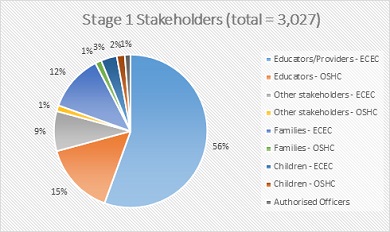It's time to have your say
Engaged by ACECQA on behalf of all governments, a tripartite including Macquarie University, Queensland University of Technology & Edith Cowan University, is leading the 2021 National Quality Framework Approved Learning Frameworks Update project.
We are seeking your feedback to ensure the ongoing currency and relevance of our two Approved Learning Frameworks, for children and young people, families and communities, teachers and educators. This includes gathering diverse perspectives to identify potential areas for updating and improving these frameworks
The two national Approved Learning Frameworks that are included in this Update are:
- The Belonging, Being and Becoming: The Early Years Learning Framework for Australia. EYLF outlines practices that support and promote learning for children from birth to five years attending education and care services such as preschool, kindergarten, long day care and family day care.
- My Time Our Place: Framework for School Age Care in Australia (MTOP). The MTOP outlines practices for children attending before/after school and vacation care.
The tripartite partnership will be collecting feedback and insights in stages, and will proactively gather the voices of educators and teachers, children and young people, families, service providers, communities, peaks, employee groups, allied health and child and family organisations. In this process we aim to identify potential areas for updating and improving these frameworks.
ALFs Update - Stage 3
ALFs Update - Stage 2
Welcome message
Project timeline
This project has two stages of public consultation to develop recommendations for the EYLF and MTOP Updates, and a piloting stage to test these recommended Updates with practitioners.
In all stages, it is the aim of the project to engage with diverse stakeholders. We have designed specific strategies to hear from children, young people, Aboriginal, Torres Strait and South Sea Islander peoples and communities, culturally and linguistically diverse families and communities, and families with children with additional needs.
Stage 1
Stage 1 was completed in July 2021 and included:
- a review of literature and current curriculum frameworks (448 papers & 14 frameworks).
- feedback from over 3,000 stakeholders (see chart below).
- 2,838 educators, service providers, families, and other professionals from all jurisdictions and all types of ECEC and OSHC. services completed survey 1.
- the voices (drawn and written) of 102 children from ECEC settings and 51 young people in OSHC settings.
- focus group discussions with 37 representatives from state and territory Regulatory Authorities.
Stakeholder participation in Stage 1
 You will find more detailed information about Stage 1 stakeholder representation here, including by State/Territory, National Quality Standard Quality Rating, type, and size of Approved Provider. More information about the voices of children and young people is provided here. Stage 1 informed the preparation of this Discussion Paper. We thank all stakeholders for their time and contribution to this important work.
You will find more detailed information about Stage 1 stakeholder representation here, including by State/Territory, National Quality Standard Quality Rating, type, and size of Approved Provider. More information about the voices of children and young people is provided here. Stage 1 informed the preparation of this Discussion Paper. We thank all stakeholders for their time and contribution to this important work.
You can read the Stage 1 Update Flyer here.
Gathering rich evidence to inform the recommendations for updates to the EYLF and MTOP
During Stage 2, stakeholders can provide feedback on the Discussion Paper via a second online survey or by written submission. Children and young people will be asked crafted questions about the discussion paper. Additionally, five discussion panels with stakeholders will be used to consider the information provided by the survey and children’s and young people’s voices. Stage 2 Discussion Paper and survey is available here.
Sector piloting of draft updates to EYLF and MTOP
Sixteen pilot sites will be selected with well-regarded practice leaders. The sites will include the workplaces of the six practice buddies that have worked in Stage 1 and 2 with the core writing group, as well as and the five practitioners in the consortium. The sample will be spread across states and territories, jurisdictions (eg. government, private, community based) and those that cater for different economic and linguistically diverse communities to ensure the potential ALF updates are examined across multiple and contextually different sites.